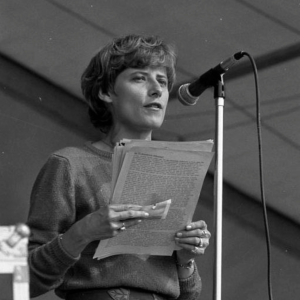
Petra Kelly is linked to renewable energy through her connections to the Green Party and anti-nuclear movements. These anti-nuclear movements in turn promoted other forms of renewable energy, like wind, water and solar, in order to reduce the need for nuclear power and fuel, which can, and has, had detrimental effects on people and the environment.
Kelly is most well known for being a founding member of the German Green Party and an ecofeminist activist; she described herself as a “German feminist/Pacifist” (Miller, 2008).
Kelly was born in 1947 in in Gunzburg Bavaria. Her father left when she was seven and Kelly was predominantly cared for by her grandmother while her mother worked at a US Army Post Exchange. In 1958 her mother married a US Army Corps of Engineers officer and moved to Fort Benning, Georgia less than a year later.
Kelly’s years among the American civil rights and peace movements greatly shaped her beliefs. She studied political science at the School of International Service at American University, during which time she briefly worked in the office of Senator Robert Kennedy, for the 1968 elections. After graduating in 1970 she obtained her master’s from the University of Amsterdam.
In 1970 Kelly’s sister died of cancer and radiation illness, which motivated her to work with anti-nuclear and anti-war movements to protest the use of atomic bombs and nuclear fuel. While working for the Economic and Social Committees of the European Community in the early 1970s, Kelly began her work on environmental campaigns and women’s rights.
The apex of her career was in 1979, when she had a leadership role in the German Green Party; in 1983 she was elected to the German Bundestag with the Green Party, where she would hold a seat until 1990. In 1982 she received the Right Livelihood Award for her work uniting ecological concerns with disarmament and human rights.
Throughout her career Kelly was a prominent public speaker, and author of multiple books on ecological problems and nuclear power, including Fighting for Hope and Hiroshima. In 1983 after winning the Alternative Nobel Prize in Stockholm, Kelly gave a speech about the dangers of the nuclear movement, with the increase of nuclear bombs creating a clear threat to humanity and the environment. She didn’t want to paint the anti-war movement as wholly negative, as it should instead be seen as a pro-environment movement. Kelly also wrote an article in an issue of the Undercurrents magazine where she shared her beliefs concerning women’s roles within ecological societies, as well as women being at the forefront of peace movements because of their more innate understanding of peace.
Kelly died in 1992 with her partner in Bonn, in what police suspect was a murder suicide by her partner.
Sources
Kelly, Petra, “Have We a Future?” (Undercurrents, 59, April/May 1983, pp. 17-20)
Kelly, Petra, “Women and the Future” (Undercurrents, 55/56, September 1982, pp. 29-31)
Miller, Stephen, Thinking Globally: Actin (Trans-) Locally: Petra Kelly and the transitional roots of West German Green Politics (Chapel Hill, 2008), pp.1-8.
https://www.independent.co.uk/news/people/obituary-petra-kelly-1558649.html
https://rightlivelihood.org/the-change-makers/find-a-laureate/petra-kelly
